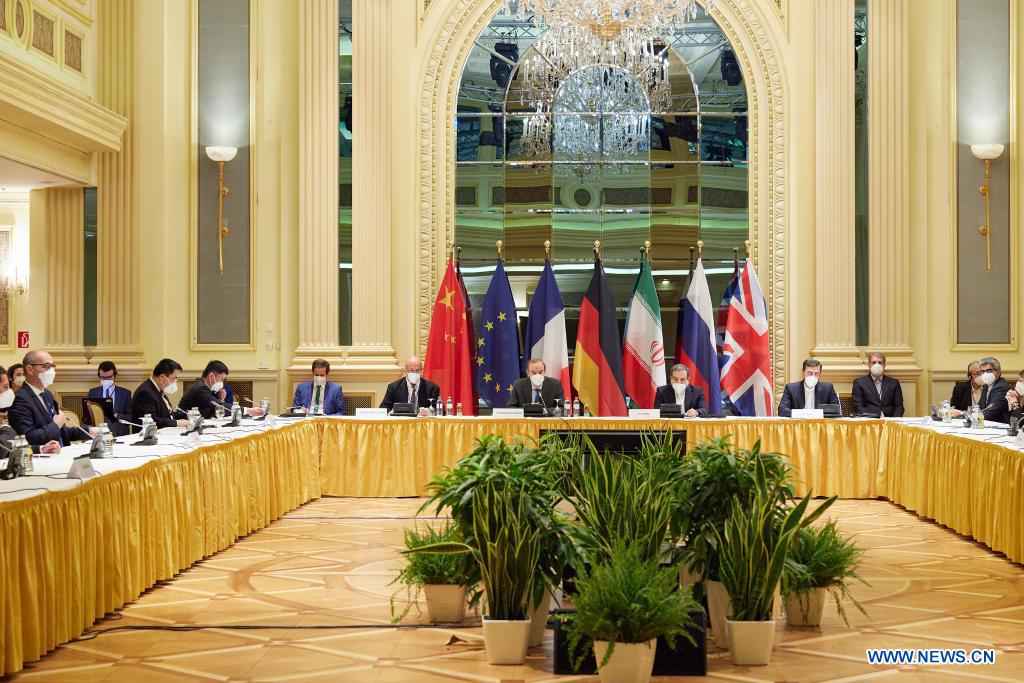Parties to Iran nuclear deal should remove all disturbances, speed up talks: Chinese envoy
Photo taken on April 15, 2021 shows a meeting of the Joint Commission of the Joint Comprehensive Plan of Action (JCPOA) in Vienna, Austria. Wang Qun, Chinese envoy to the United Nations and other international organizations in Vienna, said Thursday that all parties to the 2015 Iran nuclear deal, or the Joint Comprehensive Plan of Action, should remove all disturbances and speed up the negotiation process to hash out an arrangement for the U.S. and Iran to resume compliance with the deal. (EU Delegation Vienna/Handout via Xinhua)
VIENNA, April 15 (Xinhua) -- A Chinese envoy said Thursday that all parties to the 2015 Iran nuclear deal, or the Joint Comprehensive Plan of Action (JCPOA), should remove all disturbances and speed up the negotiation process to hash out an arrangement for the U.S. and Iran to resume compliance with the deal.
Wang Qun, Chinese envoy to the United Nations and other international organizations in Vienna, made the appeal at a meeting of the Joint Commission of the JCPOA in Vienna.
The envoy also called on the United States to immediately and unconditionally return to the nuclear deal. He said Washington should lift all sanctions relating to the Iran nuclear issue -- be it sanctions on Iran or long-arm jurisdiction measures on third-party entities and individuals.
Lifting the sanctions is not only the key to the success of the negotiations, but also what should be done for resuming JCPOA implementation and safeguarding the deal, the envoy said.
The burning issue is that the United States should come up with a concrete plan to lift the sanctions, and based on this, Iran comprehensively resumes the implementation of the JCPOA, wang said.
The Joint Commission of the JCPOA resumed its talks on Thursday in Vienna, after a blackout struck the Natanz enrichment facility in central Iran on Sunday morning. Iranian authorities have accused Israel of the "sabotage."
Wang said that China has noticed the sabotage of Iran's Natanz nuclear facility, and "we strongly condemn it and firmly oppose it."
China has also noticed that relevant countries on Wednesday issued a joint statement expressing concerns over Iran's announcement of installing additional centrifuges and increasing its uranium enrichment purity. "It is hoped that all parties will exercise restraint and not overreact," Wang said.
Wang stressed that the above-mentioned developments have made China even more convinced that at the key juncture of the current Iranian nuclear situation, all parties concerned should strive to maintain the good momentum of the negotiations since last week.
Wang said that the Joint Commission should continue to focus on specific plans for U.S. sanctions-lifting through two major processes -- the nuclear implementation and sanctions-lifting working groups' work, and the "proximity talks" with the United States.
He said that China, as always, would continue to participate in the negotiations in an in-depth manner, with the aim of achieving outcomes at an early date.
Thursday's talks were chaired by Enrique Mora, the deputy secretary general and political director of the European External Action Service (EEAS). Iranian Deputy Foreign Minister Seyed Abbas Araghchi, corresponding officials from Russia, Britain, France, Germany and China attended the meeting.
Iranian President Hassan Rouhani said on Wednesday during a cabinet meeting that Iran has no problem negotiating the return to the 2015 nuclear agreement, but will do so "according to its own logic." He said the United States must implement the very same conditions that were agreed in July 2015, and as soon as Iran verifies those conditions have been met, it will "immediately fulfill all (its) obligations."
Under the JCPOA, Iran is allowed to enrich uranium only up to a 3.67-percent of purity and its stockpile should not be more than 300 kg. However, Iran has been scaling down its compliance to its JCPOA obligations since the United States withdrew from the deal in May 2018 and reimposed sanctions on the country. On Jan. 4, Iran started to produce uranium enrichment of 20-percent purity.
On Tuesday, Iranian chief nuclear negotiator Abbas Araqchi said Iran has notified the International Atomic Energy Agency (IAEA) that Iran plans to start uranium enrichment at 60-percent purity and add 1,000 advanced centrifuges to its enrichment devices in Natanz.
 |
Photos
Related Stories
- Chinese envoy calls for efforts to advance political process in Yemen
- Chinese envoy calls for integrated approach to eliminate conflict-related sexual violence
- Chinese envoy calls for resumption of Pristina-Belgrade dialogue
- Chinese envoy calls for efforts to stabilize Great Lakes region
- Momentum of political process in Mali must be maintained: Chinese envoy
Copyright © 2021 People's Daily Online. All Rights Reserved.











